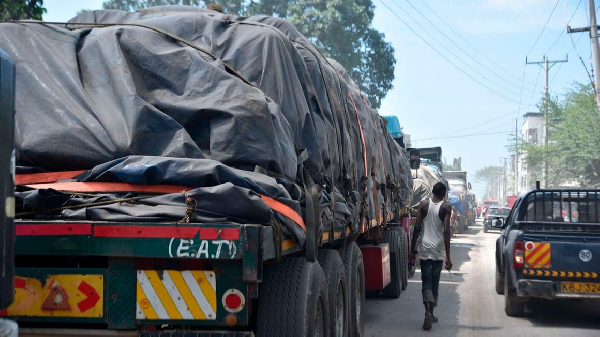
ARUSHA (Tanzania), Aug 5 (NNN-AGENCIES) — East African Community (EAC) member states are moving towards the tail end of reviewing fees, levies, and charges imposed by members on essential goods and services in the transport and agriculture sectors, which have frequently sparked trade wars and choked intra-regional trade in the eight-member economic bloc.
The streamlining of trading costs in the transport and agriculture sectors forms the initial phase of a mega plan by the regional authorities to harmonise some levies and fees and completely remove those which they consider ‘inflated’ and ‘discriminatory’ in seven key sectors in the region, including transport, agriculture, environment, trade, finance, energy, and tourism.
The plan, which kicked off in 2021, targets to review additional costs impacting the trading of poultry products, day-old chicks, hatching eggs, table eggs, fish and fish products, dairy, veterinary medicine products, pesticides, human and veterinary drugs in Kenya, Uganda, Rwanda, Burundi, Tanzania, South Sudan, Somalia, and the Democratic Republic of Congo (DRC).
Others are road user charges, passenger service charges in air transport, landing charges, parking charges and navigation charges, and ports docking fees for cargo ships.
People close to the process told The EastAfrican that a full list of levies, fees, and charges in the transport and agriculture sectors has been completed and is awaiting review and validation by the Sectoral Council of Ministers on Trade, Industry, Finance, and Investment, which is expected to have their next session around November.
“So far, we have a list for the agriculture and transport sectors, a draft one for that matter, and we are waiting for the next meeting of the sectoral council of ministers responsible for trade, finance, investment and industry to sit down and look at our list and validate it. After that, we will engage in the process of harmonisation,” said a source who did not want to be mentioned because he is not the authorised spokesperson.
“There are quite a number of levies, but when we started, we were looking at harmonising levies that are discriminatory. For example, where partner states impose a levy on products from a trading partner and do not impose the same levy on their domestic products, thereby distorting a level playing field for trade.”
The EAC is reviewing levies and fees on various items in the agriculture and transport sectors.
Levies being reviewed in the agriculture sector are on import and export permits for pets, dogs, and cats, import permits for live animals, transportation permits for breeding sheep and goats, inspection services fees for animals and animal products, and dairy inspection fees for imports.
In the transport sector, these charges relate to road user charges, passenger service charges in air transport, landing charges, parking charges, navigation charges, fuel service charges, application for air service licences, air service licences, and aircraft permits.
Others are fees on the registration of chemical products, radiation or atomic charges, poultry products, day-old chicks, hatching eggs, table eggs, import permit fees for fish and fish products, product registration fees for veterinary medicine products, export fees for pesticides and permits, inspection fees for imports of plants and products, phytosanitary certificates, registration of human and veterinary drugs, and applications for a general import or export permit.
Others are ports docking fees for cargo ships, port docking charges for special purpose vessels engaged in private commercial activities, port gate fees for trucks, port storage charges for warehouse cargo, and port storage charges for open storage.
“There are two objectives of this process: harmonisation or removal. There are levies that would be identified as being of the nature of charges of equivalent effect. These are levies that are almost equivalent to import duty. As you know, in the EAC we do not have import duty because it was removed after the implementation of the customs union protocol, but in the protectionist tendencies of partner states, some impose levies that are almost equivalent to import duty,” said a source.
“For example, some partner states are charging levies on meat and meat products as a protectionist measure, but if you calculate them, they are actually higher than import duty. Those charges will be identified, and there will be a proposal to remove them.”
Total intra-EAC trade grew by 11.2 percent to $10.91 billion in 2022 from $9.81 billion, whereas the percentage share of intra-EAC trade to EAC total trade stood at 15 percent in 2022, according to the EA Trade and Investment report (2022).
The major intra-EAC traded products are cereals, cement, iron and steel, live animals, petroleum products, sugar, foods, and beverages. The EAC continues to be a major market for Kenya’s domestic exports.
Kenya’s domestic exports rose by 112.5 percent to $3.51 billion in 2022 from $1.65 billion in 2021, while its domestic exports to COMESA substantially declined by 61.3 percent to $665.97 million from $1.72 billion in the same period.
Its exports to SADC declined by 70.5 percent to $220.60 million from $746.78 million.
Kenya has historically been a significant exporter of poultry and poultry-related products to Tanzania, including day-old chicks (DOC), hatching eggs, parent stock, and processed poultry items.
However, in 2021, Tanzania imposed a ban on poultry imports from Kenya due to the global outbreak of Highly Pathogenic Avian Influenza (HPAI). — NNN-AGENCIES




